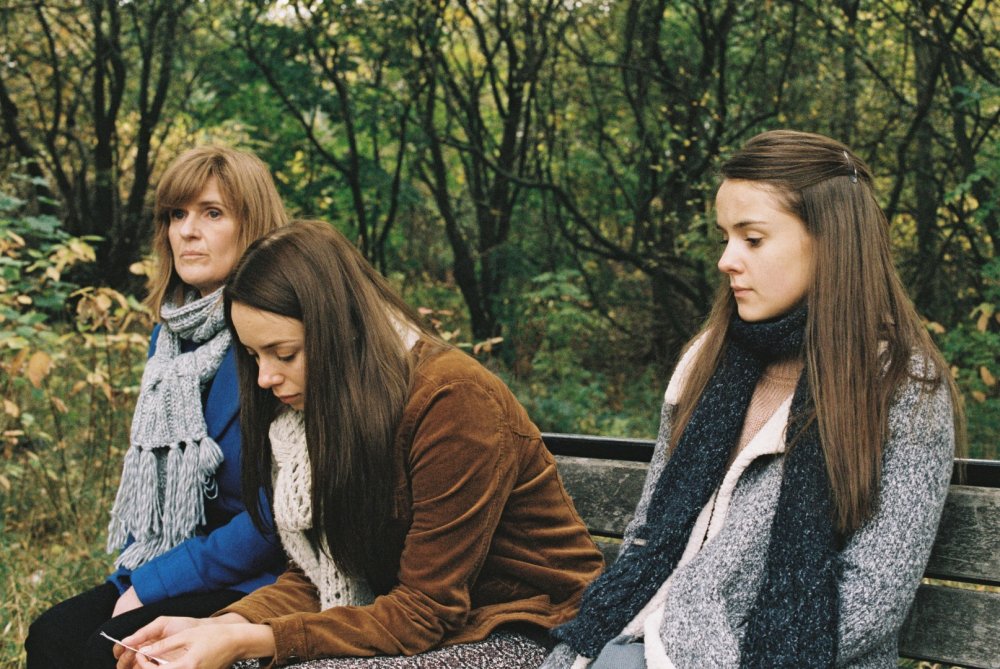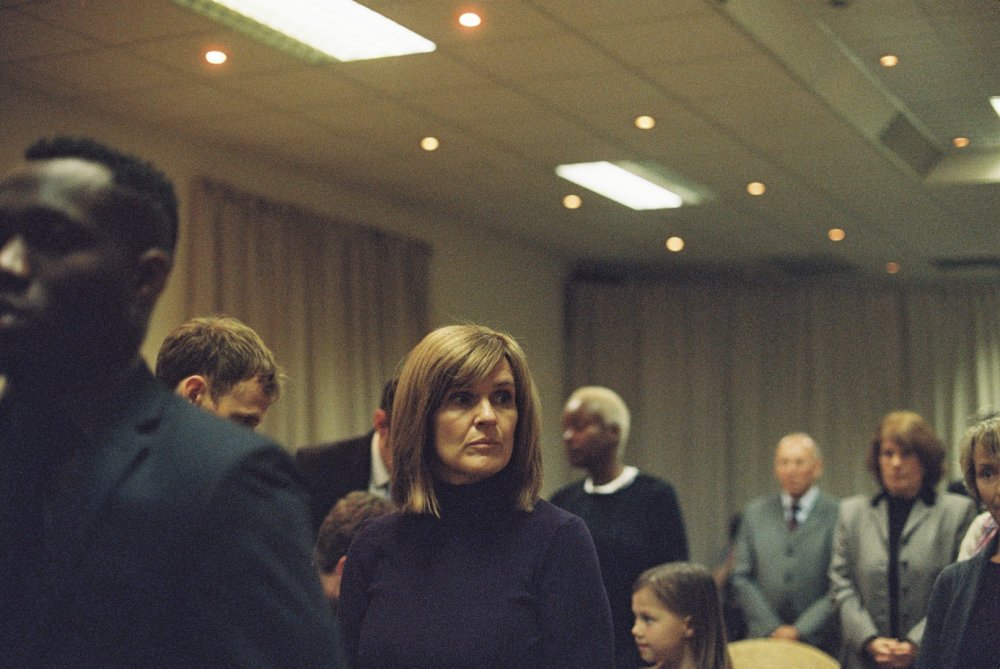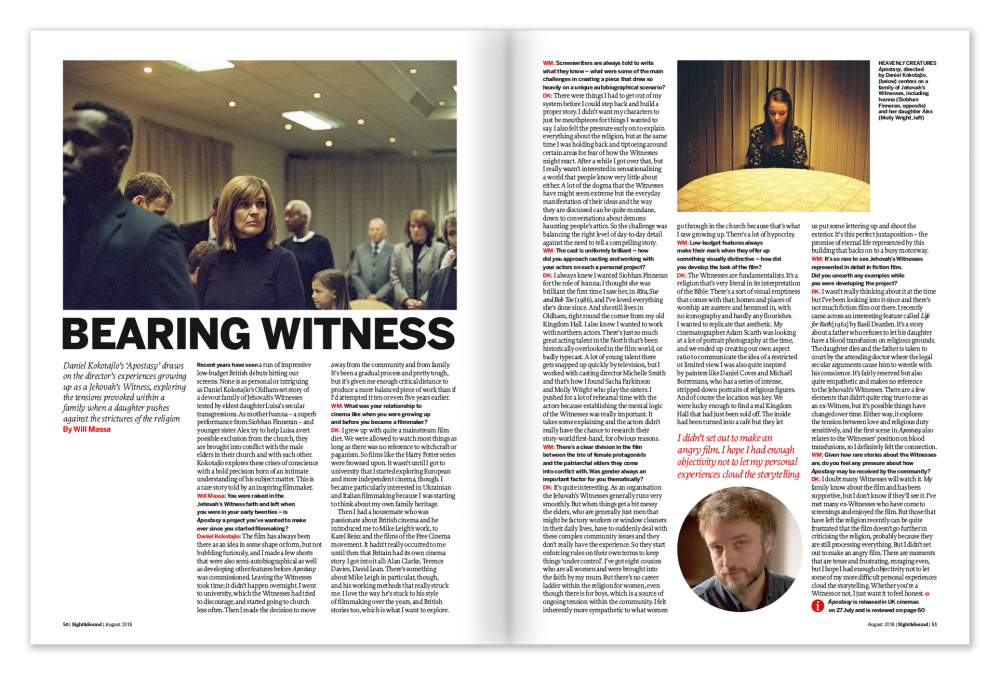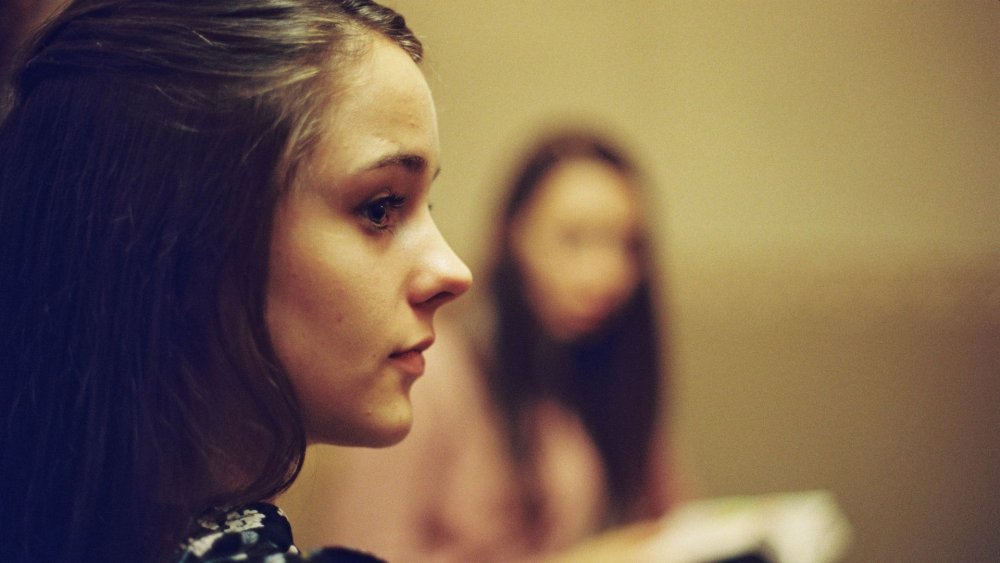Spoiler alert: this review reveals a plot twist
“I’m sorry, Jehovah.” These three words, the first spoken in Daniel Kokotajlo’s powerful feature debut Apostasy, set the tone for a sensitive yet potent exploration of faith, grief and guilt. Though his film takes place entirely within a Jehovah’s Witness community in Oldham, Manchester, writer-director Kokotajlo – himself a former Witness – expertly taps into wider themes of love, loss and the psychological quicksand of immovable belief.
UK 2017
Certificate PG 95m 12s
Director Daniel Kokotajlo
Cast
Ivanna Siobhan Finneran
Luisa Sacha Parkinson
Alex Molly Wright
Steven Robert Emms
Elder Brian James Quinn
[1.56:1]
part-subtitled
UK release date 27 July 2018 in cinemas and on demand
Distributor Curzon Artificial Eye
curzonartificialeye.com/apostasy
► Trailer
Those apologetic words come from 18-year-old Alex (Molly Wright), and are heard during an internal conversation she has with Jehovah as she listens to her doctor advocate blood transfusions to manage her anaemia. This is the first instance of Alex voicing her inner dialogue at key moments, an approach that works as an insight both into her emotions and into the wider faith. There have already been films about the Jehovah’s Witness community, including Marco Daniele’s Worldly Girl (2016) and documentaries Knocking (2006) and Truth Be Told (2012), but Alex acts as an essential touchstone for those unfamiliar with Witness practices.
As Alex’s mother Ivanna (Siobhan Finneran) angrily explains why their Witness faith means that such medical intervention is utterly unthinkable, we understand the force of a faith that comes above everything, even a daughter’s physical wellbeing. It’s a theory that will be tested to breaking point. While Alex is moulded in her mother’s image, speaking reverentially of the children who have sacrificed themselves for Jehovah, older sister Luisa (Sacha Parkinson) is increasingly less pliable. Alex spends all her time ensconced in the Witness community – at meetings, community gardening with fellow devotees – but Luisa’s experience of college has begun to open her eyes to the wider world. When she falls pregnant by her Muslim boyfriend, her decision not to convert him to the faith sees her disassociated by the elders. (That this self-appointed governing body is made up entirely of men is a point that Kokotajlo doesn’t need to hammer home.)

Siobhan Finneran as Ivanna, Sacha Parkinson as Luisa and Wright
The rift this causes is immediate, with Ivanna and Alex forbidden to interact with Luisa beyond the most basic communication. This is a particular kind of insidious cruelty; coming not via harsh words or from a place of hatred, it is a withdrawal of love and support at a time when it is most needed, all in the name of spiritual salvation. Alex is hit hard by this, but distraction comes in the form of new elder Steven (Robert Emms) and the start of a tentative courtship, which has the blessing of both Ivanna and the community. (There is a sense, never vocalised, that this relationship has been orchestrated to keep Alex in the fold.) Yet even this chink of happiness cannot last. When Alex succumbs to her illness after refusing medical intervention, the tragedy puts yet more strain on Ivanna and Luisa’s fractured relationship.
As Ivanna’s grief causes her to retreat further into her religion, her internal conversations with God taking over from her daughter’s, Luisa’s increasing isolation forces her to reconnect with the church. Yet, heavily pregnant and unable to convince the elders that she truly wishes to repent, frustration overwhelms her and she walks away for good. “Do you think it’s right how they make you treat me?” she sobs to her mother. Ivanna sides with the Witnesses.

Finneran as Ivanna
The even handling of this pivotal moment, and the film as a whole, speaks to Kokotajlo’s great judgement and skill. By focusing on all three women at the story’s heart (and bolstered by powerful, nuanced performances from Wright, Finneran and Parkinson), he allows glimpses of humanity on both sides of the faith divide, maintaining a degree of dramatic balance when it would have been so easy to resort to criticism and condemnation. For an outsider audience, so much of the Witness faith seems damaging and contradictory, but we are reminded that for many it is also a genuine source of community, kinship and comfort.
And yet there is no denying the film’s message about the dangers of indoctrination, which could be said of any strict social order. The proselytising is measured not in rally cries but in quiet, introspective moments. At Alex’s memorial service, for example, Elder Brian (James Quinn) paints her as some kind of martyr who will benefit from the spoils of the New World Order. Though his voice is calm, his words benign, the idea that we should in some way mistreat the living to secure a future paradise is one shared by extremists of various persuasions and is, to many of us, utterly chilling.
Cinematographer Adam Scarth matches the film’s subtlety with a creeping, claustrophobic aesthetic that allows for very little light. Much is shot in close-up, and the action never widens beyond the religion. Ivanna’s home is functional, subdued; the scruffy Kingdom Hall where meetings take place juts out from the side of a motorway, modern life rushing past behind it; the sky is always full of clouds. Moments of colour (a neon-lit nail bar), of humour (one young Witness speaks of demons in the attic, to much laughter), are jolting, and fleeting. This is an oppressive world of rules, in which suffering and sacrifice are payment for a future promise that is unlikely ever to be fulfilled.
In the August 2018 issue of Sight & Sound

Interview: Bearing witness
Daniel Kokotajlo’s Apostasy draws on the director’s experiences growing up as a Jehovah’s Witness, exploring the tensions provoked within a family when a daughter pushes against the strictures of the religion. By Will Massa.
-
The Digital Edition and Archive quick link
Log in here to your digital edition and archive subscription, take a look at the packages on offer and buy a subscription.






